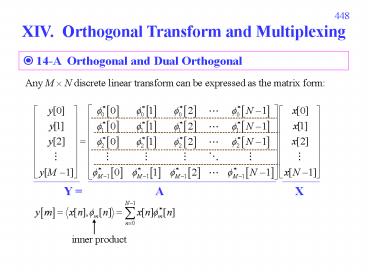Time Frequency Analysis and Wavelet Transforms ????????? - PowerPoint PPT Presentation
Title:
Time Frequency Analysis and Wavelet Transforms ?????????
Description:
XIV. Orthogonal Transform and Multiplexing 14-A Orthogonal and Dual Orthogonal Any M N discrete linear transform can be expressed as the matrix form: – PowerPoint PPT presentation
Number of Views:147
Avg rating:3.0/5.0
Title: Time Frequency Analysis and Wavelet Transforms ?????????
1
XIV. Orthogonal Transform and Multiplexing
? 14-A Orthogonal and Dual Orthogonal
Any M ? N discrete linear transform can be
expressed as the matrix form
Y A
X
inner product
2
Orthogonal
when k ? h
- orthogonal transforms ???
- ? discrete Fourier transform
- ? discrete cosine, sine, Hartley transforms
- ? Walsh Transform, Haar Transform
- ? discrete Legendre transform
- discrete orthogonal polynomial transforms
- Hahn, Meixner, Krawtchouk, Charlier
3
?????????,????? orthogonal transform? Orthogonal
transform ????????
4
? If partial terms are used for reconstruction
for orthogonal case, perfect reconstruction par
tial reconstruction
K lt N
reconstruction error of partial reconstruction
?? ?????,???? K ??,
reconstruction error ??
5
For non-orthogonal case, perfect
reconstruction partial reconstruction
B A-1
K lt N
reconstruction error of partial reconstruction
??
??????, ???? K ??, reconstruction error
??
6
? 14-B Frequency and Time Division Multiplexing
?? Digital Modulation and Multiplexing?? Fourier
transform
? Frequency-Division Multiplexing
Xn 0 or 1
Xn can also be set to be -1 or 1
When (1) t ? 0, T (2) fn n/T
it becomes the orthogonal frequency-division
multiplexing (OFDM).
7
Furthermore, if the time-axis is also sampled
t mT/N, m 0, 1, 2, .., N-1
then the OFDM is equivalent to the transform
matrix of the inverse discrete Fourier transform
(IDFT), which is one of the discrete orthogonal
transform.
Modulation
8
Modulation
Demodulation
Example N 8 Xn 1, 0, 1,
1, 0, 0, 1, 1 (n 0 7)
9
? Time-Division Multiplexing
(also a discrete orthogonal transform)
10
??
?? time-division multiplexing ???? ???????
frequency-division multiplexing
? orthogonal frequency-division
multiplexing (OFDM)?
11
? 14-C Code Division Multiple Access (CDMA)
?? frequency-division multiplexing ?
time-division multiplexing,?????? multiplexing
????
????? orthogonal transforms ? code division
multiple access (CDMA)
CDMA is an important topic in spread spectrum
communication
????
1 M. A. Abu-Rgheff, Introduction to CDMA
Wireless Communications, Academic, London,
2007 2 ???, ????, CDMA ??????, ??, ??, 2002.
12
CDMA ????? orthogonal transform ? Walsh transform
channel 1
channel 2
channel 3
channel 4
channel 5
channel 6
channel 7
channel 8
13
?????????????? (A ?B??), (C ?D??)
, ????????????? (1) ???? (2) ???? (3) ????
14
- CDMA ??
- (1) Orthogonal Type (2) Pseudorandom
Sequence Type - Orthogonal Type ??? ???? 1, 0, 1 1,
1, 0 - (1) ? 0 ?? -1 1, -1, 1 1, 1,
-1 - (2) 1, -1, 1 modulated by 1, 1, 1, 1, 1, 1,
1, 1 (channel 1) - ? 1, 1, 1, 1, 1, 1, 1, 1, -1, -1, -1, -1,
-1, -1, -1, -1, 1, 1, 1, 1, 1, 1, 1, 1
- 1, 1, -1 modulated by 1, 1, 1, 1, -1,
-1, -1, -1 (channel 2) - ? 1, 1, 1, 1, -1, -1, -1, -1, 1, 1, 1,
1, -1, -1, -1, -1, -1, -1, -1, -1, 1, 1, 1, 1
- (3) ??
- 2, 2, 2, 2, 0, 0, 0, 0, 0, 0, 0, 0,
-2, -2, -2, -2, 0, 0, 0, 0, 2, 2, 2, 2
15
demodulation
2, 2, 2, 2, 0, 0, 0, 0, 0, 0, 0, 0, -2, -2, -2,
-2, 0, 0, 0, 0, 2, 2, 2, 2
1, 1, 1, 1, 1, 1, 1, 1
1, 1, 1, 1, 1, 1, 1,1
1, 1, 1, 1, 1, 1, 1, 1
?? 8
16
?? (1) ?? N-point Walsh transform ?,?????N ?
channels (2) ?? Walsh transform ??,??? orthogonal
transform ????? (3) ?? Walsh transform ???
17
- ? Orthogonal Transform ????? ????
synchronization - R1 1, 1, 1, 1, 1, 1, 1, 1
- R2 1, 1, 1, 1, ?1, ?1, ?1, ?1
- R5 1, ?1, ?1, 1, 1, ?1, ?1, 1
- R8 1, ?1, 1, ?1, 1, ?1, 1, ?1
- ???? basis, ???????? orthogonal
- ltR1n, R1ngt 8, ltR1n, Rkngt 0 if k ?
1 - ltR1n, Rkn?1gt 2 or 0 if k ? 1.
18
- Pseudorandom Sequence Type
- ?? orthogonal,capacity ??
- ??????? (asynchronous)
- Pseudorandom Sequence ??? correlation
- b1p(t ?1) b2p(t ?2)
- recovered
- (? C(0) 1, C(?2 ? ?1) ? 0)
- ?1, ?2 ????
19
- CDMA ???
- (1) ?????? frequency division multiplexing ????
- (2) ???? noise ? interference???
- (3) ?????????????
- (4) ??????????,?????????? recover ??
- (5) ??????????????
20
?????,???????????,?????
B ?
A ?
?? A ???? orthogonal basis ? ?kn, k 0, 1, 2,
, N-1
B ???? orthogonal basis ? ?hn, h 0, 1, 2, ,
N-1
???
???
k 0, 1, 2, , N-1, h 0, 1, 2, , N-1
21
???? 3-D Accelerometer ???
3-D Accelerometer ?????,??????
????(?????????) ????????? ???????????????
?? ???? (???) ?? (??,???)
????,? Parkinson ????,??????
?? (??????,??????????)
22
z-axis
y-axis
x-axis
?? x, y, z ??????????,???????? ??????, z-axis
????? g 9.8
23
??????, z-axis ???????? 9.8, ?? x ? y ????????
0
24
???????????.
???,?????????????
25
?????
? ????????,?????,???????????? ???,??????? Fourier
transform,?? 1812 ???,????????,??
1822????????,????,??????????
? ?????????,????????
26
- ?????????!
- ????????????,???? digital signal processing ?
time frequency analysis ?????,??????????































